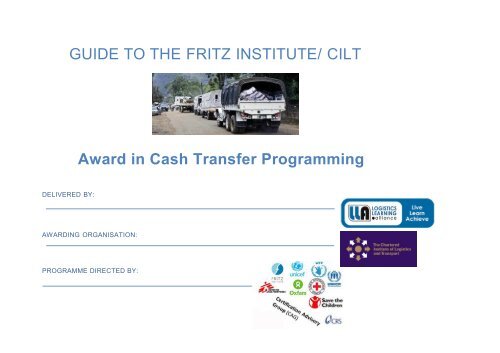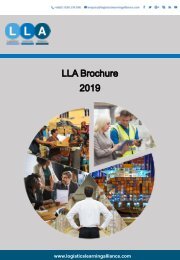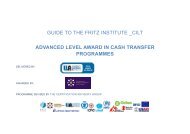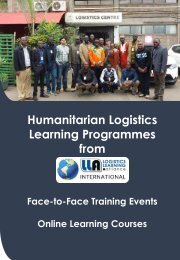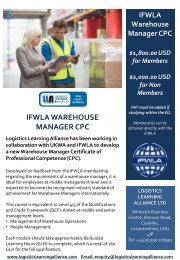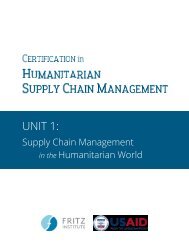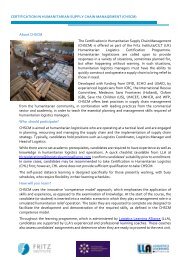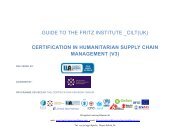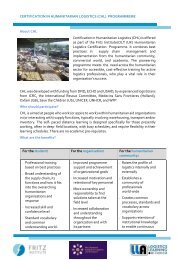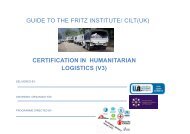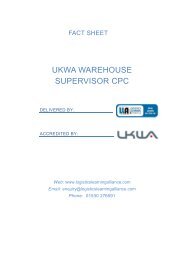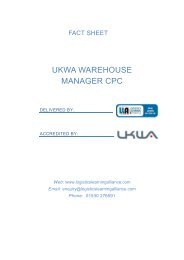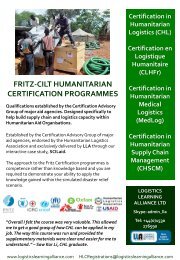CHL CTP Award Guide - 2018
You also want an ePaper? Increase the reach of your titles
YUMPU automatically turns print PDFs into web optimized ePapers that Google loves.
GUIDE TO THE FRITZ INSTITUTE/ CILT<br />
<strong>Award</strong> in Cash Transfer Programming<br />
DELIVERED BY:<br />
AWARDING ORGANISATION:<br />
PROGRAMME DIRECTED BY:
GUIDE TO THE CERTIFICATION IN HUMANITARIAN LOGISTICS<br />
CONTENTS<br />
Introduction ....................................................................................................................................................................................................... 3<br />
Logistics Learning Alliance Ltd .......................................................................................................................................................................... 3<br />
Cash Tranfer Programming ............................................................................................................................................................................... 4<br />
The Case Study And Learning System .............................................................................................................................................................. 4<br />
The Assessment Process .................................................................................................................................................................................. 5<br />
Scilaid Case Study ............................................................................................................................................................................................ 5<br />
Qualification Structure ....................................................................................................................................................................................... 7<br />
<strong>Award</strong> In Cash Transfer Programming (<strong>CTP</strong>) ................................................................................................................................................... 7
INTRODUCTION<br />
This guide provides background information to the Logistics Learning Alliance’s programme for the Fritz Institute/CILT <strong>Award</strong> in<br />
Humanitarian Logistics Cash Transfer Programming.<br />
Under the Project Management of the Fritz Institute the programmes were developed and designed through a partnership of leading<br />
humanitarian aid agencies, the UK’s pre-eminent institute for Logistics and Supply Chain training, CILT and Logistics Learning Alliance Ltd<br />
(LLA). This supported, distance learning Programme is delivered through a model developed by LLA and used extensively in its commercial<br />
sector learning programme but now adapted to the humanitarian scenario. LLA is the sole CILT Approved Centre delivering these programmes.<br />
We will allocate you a specialist coach who will support, guide and assist you to the conclusion of the qualification. The coach’s role is to<br />
ensure that you can access the required learning and then to steer you through its effective application in a highly realistic humanitarian<br />
situation. Our coaches have been involved with training people working in the supply chain and its related activities for many years.<br />
At the end of this programme we are confident that you will be equipped to apply the concepts in your chosen operation. We really look<br />
forward to working with you to help you realise the potential you clearly believe you have.<br />
LOGISTICS LEARNING ALLIANCE LTD<br />
The coaches at LLA have been involved with training people working in the supply chain and its related activities for many years.<br />
In the UK we are a CILT Approved Centre for the delivery of their qualifications, managing the learning programmes for many students<br />
who pursue their qualifications by distance learning.<br />
Our experience of working with a wide range of organisations gives us a good view of the challenges facing twenty first century supply<br />
chain management and this experience is reflected in the design and delivery of this certification programme.
CASH TRANFER PROGRAMMING<br />
Cash Transfer Programming (<strong>CTP</strong>) is the standard term used to refer to humanitarian programmes using cash or vouchers as the mode for<br />
assisting beneficiaries in preference to direct aid. Alternative terms for the same type of programming are ‘cash-based interventions’ (CBI),<br />
‘cash and vouchers’, and simply ‘cash’.<br />
There is an increasing trend to develop cash transfer mechanisms to people in need rather than direct aid commodities. While this gives the<br />
recipients the freedom of choice on what to do with the money, it also helps to maintain local supply chains.<br />
This <strong>Award</strong> helps prepare Humanitarian Logisticians, so they understand the reasons why <strong>CTP</strong> might be used, the processes involved in<br />
getting to those decisions and their role in implementing them.<br />
THE CASE STUDY AND LEARNING SYSTEM<br />
Supported Self Study is attractive to logistics/supply chain practitioners as it easily fits into a pattern of life that often involves<br />
erratic working hours and transient working locations. Traditionally though it is a learning method with a downside. At times you can<br />
seem to be isolated with nowhere to turn to for support. This is not the case with this programme. From the outset of the programme,<br />
candidates are allocated a coach/tutor with specialist knowledge of the subject area. Candidates are encouraged to contact their coach or<br />
the Admin Team whenever they need advice and guidance. Coaches are available by telephone during normal UK business hours (0900 to<br />
1700 UK time), outside of these times by prior arrangement or by e-Mail at any time. Experience has shown us that the most successful<br />
students are those who do not hesitate to contact their coach whenever they need support.<br />
The learning process includes a detailed case study that is a broad but intensive exploration of an NGO, SCILaid, involved in an on-going<br />
humanitarian aid operation. For the purposes of the study programme learners are „recruited‟ by SCILaid and appointed to a position<br />
relevant to their course of study. They will perform the tasks required by their role, demonstrating the necessary competences for the<br />
qualification. This is learning by challenge and application.<br />
Logistics Learning Alliance will provide new students with an internet link enabling them to download the case study simulation to their hard<br />
drive. The full download will include<br />
‣ A “ virtual‟ introductory tour of SCILaid<br />
‣ Access to statistical and operational information about the SCILaid environment
‣ Access to management information which will provide information enabling the learner to submit work of an acceptable<br />
standard<br />
The <strong>CTP</strong> <strong>Award</strong> programme has 10 assignments or tasks. Each task should take around 3 - 5 hours to research and prepare your response.<br />
We would encourage students to plan to submit a completed assignment every week.<br />
THE ASSESSMENT PROCESS<br />
The assessment process is designed to test two things:<br />
‣ The knowledge and experience of the individual<br />
‣ The ability of the individual to apply that knowledge<br />
‣ The tasks are designed to be answered within the context of SCILaid case-study scenario. This is a highly realistic simulation<br />
of a humanitarian aid situation, not un-typical of the situation many humanitarian logisticians will be familiar with.<br />
SCILAID CASE STUDY<br />
Where candidates exceed the one year timeframe for completion of the certification programme there may be a requirement to reassess<br />
elements of the work submitted to ensure currency with the current competences. In this circumstance additional assessment fees may be<br />
payable.<br />
The case study provides a network of integrated or inter-related work-based tasks to ensure that whatever level and position within the<br />
hierarchy of SCIL plc they are appointed to, candidates will have the opportunity to demonstrate their ability to apply the knowledge gained.<br />
The assessment process will take into account prior learning, achievement and experience, which is appropriate to the requirements of the<br />
qualification.<br />
Each candidate is assigned a personal specialist coach/tutor, who will work with the candidate to provide the evidence to satisfy:<br />
‣ All the outcomes of effective performance<br />
‣ All the knowledge requirements of the qualification<br />
Evidence of performance will be assessed on an on-going basis by LLA and externally verified by the CILT.
When the CILT is satisfied that all the requirements of the<br />
qualification have been met the <strong>Award</strong> for Humanitarian Logistics<br />
Cash Transfer Programmes will be made by CILT.<br />
A 1-year time limit for the completion of the programme is granted.<br />
Students wishing to complete the programme beyond this deadline<br />
must submit a written application to LLA but should note the<br />
following<br />
‣ No application will be accepted if 2 years or more have<br />
lapsed since the student's initial registration<br />
‣ Students will have to re-start the programme after the 2-<br />
year period and re-register with LLA/CILT<br />
‣ Alternatively, students can go through the normal APL<br />
procedure for units previously completed but should be aware that<br />
they may have to assemble a completely new portfolio.<br />
Please note that these time limits are the maximum allowed to complete the qualification. Candidates are strongly urged to attempt to<br />
complete their studies within a shorter timescale and can reasonably expect to complete the programme within 6 months.<br />
Where a candidate takes in excess of one year, the continued provision of administrative support, coaching and assessment will be at the<br />
discretion of LLA.<br />
ENROLMENT<br />
To register as a candidate for the <strong>Award</strong> Programme, please complete the attached enrolment form and return it to:<br />
hlcregistrations@logisticslearningalliance.com
QUALIFICATION STRUCTURE<br />
The contents of the Units are detailed below:<br />
AWARD IN CASH TRANSFER PROGRAMMING (<strong>CTP</strong>)<br />
OBJECTIVE:<br />
LEARNING OUTCOMES<br />
The learner can…<br />
1. Explain Requirements of Cash<br />
Transfer Programming & Considering<br />
Modality Change<br />
2. Define Delivery Mechanisms,<br />
Contract Complexities, and<br />
Maintaining Competitive Procurement<br />
3. Explain assessments and the Retail<br />
Market Assessment<br />
BUILD SKILLS AND KNOWLEDGE REQUIRED FOR SUPPORTING SUPPLY CHAIN AND<br />
LOGISTICS ACTIVITIES FOR DELIVERY OF A CASH TRANSFER PROGRAMME (<strong>CTP</strong>).<br />
ASSESSMENT CRITERIA<br />
The learner will…<br />
• Explain the link between programme objectives and supply<br />
chain activities for Cash Transfer Programming(<strong>CTP</strong>)<br />
• Explain market-based interventions and hybrid response<br />
options<br />
• Communicate concerns on operational exposure by switching<br />
to <strong>CTP</strong><br />
• Explain the value of early involvement of supply chain in a <strong>CTP</strong><br />
project<br />
• Identify the types of service providers involved in <strong>CTP</strong><br />
• Explain the difference between the transfer value and transfer<br />
fee<br />
• Explain challenges of contracting for delivery mechanism<br />
service providers<br />
• Explain how to negotiate with delivery mechanism service<br />
providers in accordance with policies on competitive<br />
procurement<br />
• Explain approaches for contracting retail agents<br />
• Explain how to maintain competitive procurement while<br />
contracting retail agents<br />
• Identify which assessments supply chain leads and which it<br />
contributes to<br />
• Explain supply chains vs. programme’s perspectives on the<br />
retail market<br />
• Identify topics and sources of information for inclusion in retail<br />
market assessment<br />
• Plan a retail market assessment<br />
• Draw a basic market map and explain what it shows<br />
CONTENT<br />
• Requirements of different modalities<br />
• Link between supply chain activities and programme objectives<br />
• Risk of outsourcing supply chain / logistics activities through<br />
<strong>CTP</strong><br />
• Market-based interventions<br />
• Hybrid response models<br />
• The project cycle and when supply chain should be involved<br />
• Types of delivery mechanisms and service providers who<br />
provide them<br />
• Complexities of delivery mechanism services and fees<br />
• Valuing service provider contracts<br />
• Maintaining competitive procurement which contracting for<br />
delivery mechanism services<br />
• Retail agents<br />
• Approaches to contracting for vouchers<br />
• Maintaining competitive procurement during contracting retail<br />
agents<br />
• The goal of the Assessments & Analysis Phase (revisit)<br />
• Overview of Assessments<br />
• The Retail Market Assessment<br />
• Market-Based Interventions<br />
• Market Mapping
4. Evaluate options using appropriate<br />
analyses<br />
• Identify analyses required for a modality decision to be made<br />
• Define Supply Chain’s role and contributions to the required<br />
analyses<br />
• Calculate commodity costs based on <strong>CTP</strong> vs. local<br />
procurement vs. international procurement<br />
• Make recommendation about sourcing based on import parity<br />
price analysis and risks of sourcing markets (builds on U3#4)<br />
• Explain approaches to contracting for vouchers and implications<br />
• Identify important supply chain considerations for the<br />
Operational Design Options Analysis<br />
• Evaluate the impact to the overall supply chain budget<br />
• Contribute to analyses led by other functions<br />
5. Develop a plan to monitor the market • Explain the types of monitoring and identify which supply chain<br />
is involved in<br />
• Explain the importance of market monitoring and key<br />
components<br />
• Plan monitoring for the retail market<br />
• Overview of analyses<br />
• Procurement Options Analysis<br />
Import Parity Price Analysis<br />
Options for voucher contracting & implications<br />
• Operational Design Options Analysis<br />
• Value for Money Analysis<br />
• Risk Analysis<br />
• Response Analysis<br />
• Types of Monitoring (Post-Distribution vs. Market vs. Supplier)<br />
• Perspectives and contributions of Supply Chain vs other<br />
functions<br />
• Market Monitoring


